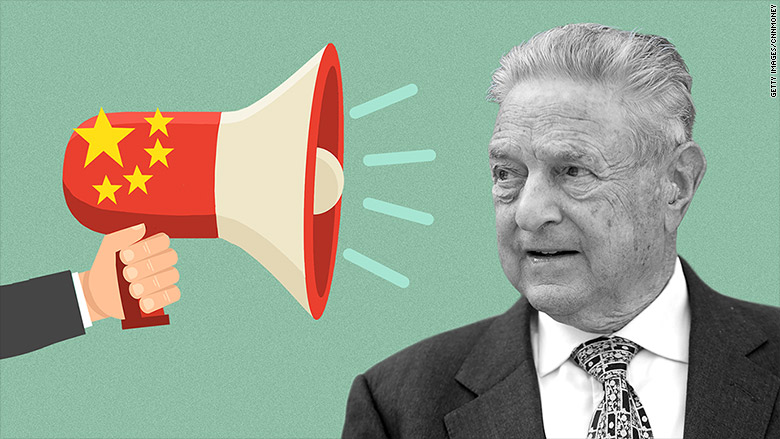
Back off! That's the message China is sending to billionaire investor and philanthropist George Soros.
The verbal broadside was published by the People's Daily, the official newspaper of China's ruling Communist Party.
"Soros openly declared war on China, asserting that he shorted a large volume of Asian currencies," said the op-ed article, which ran on the front page of the paper's overseas edition Tuesday.
It was written by a researcher at the Chinese Commerce Ministry with the scoffing headline, "Declaring war on China's currency? Ha ha."
"There is no way his challenge to the Chinese renminbi and the Hong Kong dollar will succeed," the article said.
China's attack appears to be in response to critical comments Soros has made about the world's second largest economy recently. In a speech earlier this month, he said China's economic situation "amounts to a crisis," drawing parallels with the dark days of 2008.
And just last week in a Bloomberg TV interview, he blamed the Chinese economy for the bearish outlook weighing on global markets, suggesting a hard landing for China -- a disruptive collapse in the country's economic growth -- was "practically unavoidable."
Related: China hemorrhaged $676 billion last year
His investment strategy to cope with the situation, he said, was to bet against the S&P 500, Asian currencies and countries that rely heavily on commodities, many of which have plummeted in value. (Think under $30 for a barrel of oil.)
He didn't, however, specify which currencies he was shorting.
The war of words with Soros comes at a tricky time for China, which last week posted its slowest annual growth in a quarter of a century. Beijing is also struggling with a weakening currency, and the consequences of massive capital outflows over the last year, estimated to be around $700 billion.
It's a cycle that's hard to break. Investors are getting more nervous and pulling their money, seeking better returns elsewhere. But that's putting even greater downward pressure on the yuan.
Over the last year, China's currency has lost more than 5% in value against the U.S. dollar, while the central bank has burned through hundreds of billions of dollars in efforts to moderate the decline.
Related: Why China is pumping huge sums into its financial system
Beijing has also injected massive amounts of cash into its financial system recently against a backdrop of continuing financial market turmoil.
China has reason to be worried about what Soros is saying. Over the decades, some of his biggest bets have paid off.
In 1992, he famously became known as the man who "broke" the Bank of England, scoring $1 billion with a wager that the currency would collapse. He's also been accused of speculative attacks that triggered the 1997 Asian financial crisis.
While Soros officially retired last year, he remains chairman of Soros Fund Management, which historically scores whopping returns for investors.
-- CNN's Zhang Dan contributed to this report.


